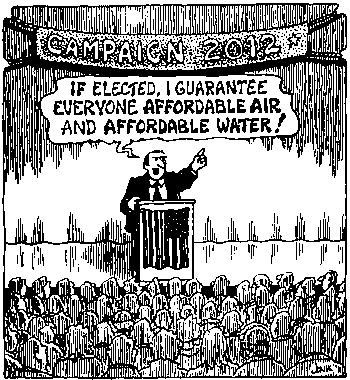|
||||
|
|
|
|||
| Home | Subscribe | Back Issues | The Organization | Volunteer | ||||
|
||||
|
TRASH TALKby Dave and Lillian BrummetBest Trash Talk Tips of 2005Dave and Lillian Brummet, authors of the book Trash Talk, offer a free service called Tip of the Month where visitors can learn new reduction and reuse ideas that will save money for the household and office on their website (www.sunshinecable.com/~drumit). Listed below are their favorite tips from 2005. GARDEN CARDBOARD Cardboard works great for weed control in the yard or garden. Lay out the flattened cardboard first making sure to overlap it by at least six inches. If the weeds are very established or if your weeds are more like small shrubs, do a double or even triple layer to ensure nothing grows through. We found that it is best to wet the cardboard with a sprinkler to soften it before applying the top layer of bark mulch or gravel so the cardboard will settle in and smother all the weeds completely. In as little as one year the cardboard will have composted into a rich loamy soil while the weeds have been killed off by lack of sunlight and air. Simply top off the bark mulch periodically as it too breaks down over the years. SECOND-LIFE SHOWER CURTAINS Reuse vinyl shower curtains as good drop cloths for painting projects. In the garden they can be used as row covers for tender spring plants (when a cold night threatens). Like costly landscape fabric, use curtains to control weeds in garden beds. Cut an X at each plant location, plant, then close the X around the plant stem. Cover the entire sheet with rocks, gravel or bark mulch. DONATE BOOKS Promote reading in your community, reduce clutter around your home and your contribution of waste in the landfill, save a buck or two and benefit a charity while you are at it. Just how are you supposed to do all this? Go through your closets and bookshelves and look for all the used books and magazines that you no longer read. Any library, shelters for the disadvantaged, hospitals and missions are all places to consider for donating. Use the key words "book donation" in a search engine to find places to donate to. Here are just a few sites: www.sabre.org/books/bookorg/bkdn_toc.htm www.loc.gov/rrr/amed/afs/alc/bkdncte.html www.ala.org lists contact information for organizations that distribute used books. www.nationalbook.org/bookdonations.html lists places that accept book donations.
Management of used books and magazines is a very environmental and community conscious thing for people to participate in. Extending the life of books and magazines is easily accomplished by taping the binding and edges of the covers.
Happy Earth Day to everyone!Just the other day there was a group of children walking on our streets downtown with bags cleaning up the area. We could all learn from this selfless act. Did you know that wind and traffic-caused breezes carry waste from inland to waterways (creeks, rivers, oceans, bogs, etc)? Astoundingly, up to 80% of the waste found in waterways originates inland. When looked at in this way, such small selfless acts take on a whole new meaning. There are all kinds of things we can do today, starting right now, that make an immediate difference. We can choose to walk or bicycle to our destinations. We can bring home a tree or other environmentally beneficial plant that produces food for the family, protection for wildlife, or shades your home from hot summer sun. Plants can be selected for their ability to clean air, water and soil or preventing erosion. Look around your home and office. Are you managing waste and energy as efficiently as you can? How about stand-by power use? This is the power continually consumed by flashing lights and power lights (on appliances, stereos, computer equipment and so on) when equipment is not in use. Unplug these power drains when they are not in use. A very simple way to manage this is to use power bars. In this way, you can turn off every machine in the entertainment center, for instance, with a flick of one switch. Power bars also protect against damage caused by power surges. Yes, these are just little things, but they do make a difference. Earth Day (April 22nd) is about awareness--it is about engaging individuals to make a difference. Pretty soon it is like ripples in a pond, the waves just keep getting bigger. Written by Dave and Lillian Brummet based on the concept of their book, Trash Talk. The book offers useful solutions for the individual to reduce waste and better manage resources. A guide for anyone concerned about their impact on the environment. (www.sunshinecable.com/~drumit) |
|

